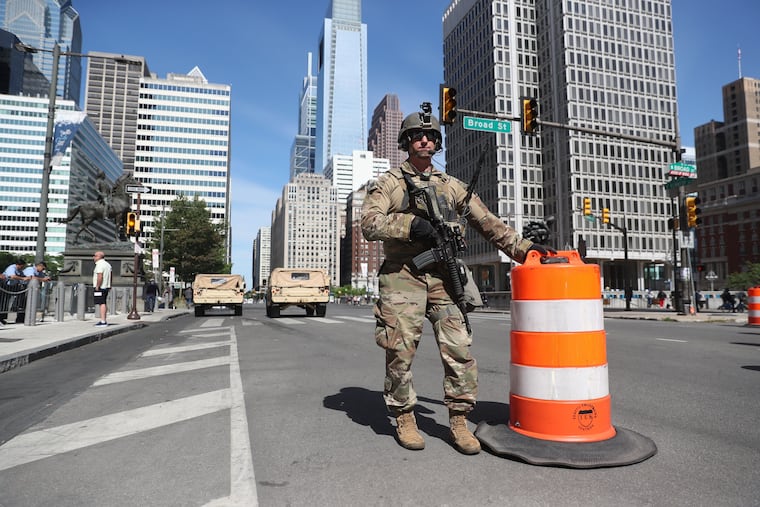What is the National Guard and why is it here?
Philadelphia is not the only city experiencing this new military presence. As of Monday night, at least 23 states and the District of Columbia had activated the National Guard. Who are they and what do they do?

The National Guard moved into Philadelphia early Monday after the weekend’s impassioned protests over the death of George Floyd erupted into violence.
Carrying M4 Carbine rifles and wearing camouflage fatigues, hundreds of members could be seen standing on street corners around City Hall and surrounding the Frank Rizzo statue, which had a the focus of protests on Saturday. On Monday, some National Guard members also blocked roads around Upper Darby’s 69th Street shopping district to help control traffic.
Philadelphia is not the only city experiencing this new military presence. As of Monday night, at least 23 states and the District of Columbia had activated the National Guard, according to CNN, and the more than 17,000 members deployed in the country equal the number of active-duty troops in Iraq, Syria, and Afghanistan.
But what is the National Guard? What authority does it have here? Here are some answers to your questions:
What exactly is the National Guard?
The Army National Guard is a part of the U.S. military that is tasked with responding to domestic emergencies, such as natural disasters and civil unrest. Each state and the District of Columbia has its own National Guard.
The Guard can also be deployed for overseas combat and other international missions. For example, Guard units were deployed in Afghanistan and Iraq in the years after 9/11.
» READ MORE: Here's live coverage of what's happening June 2
The Guard serves in both state and federal roles. It can be called upon by the president or, with a governor’s authorization, by the adjutant general, a state’s senior military officer.
Who makes up the Guard forces?
Guard members are primarily civilians who have other jobs, too, or attend college. They serve in the military part time, usually attending training for one weekend a month and two weeks in the summer. Most serve in their home states.
In order to join the Guard, one must be between the ages of 17 and 35, be a U.S citizen or permanent resident, and meet “medical, physical, and moral requirements.” Candidates also have to complete a 10-week basic training. Commitments are technically eight years long, but service may be required for as few as three to six years before members move into a reserve role.
Why is the National Guard in Philadelphia?
On Sunday, Gov. Tom Wolf said he had given the OK for the Pennsylvania National Guard and the Pennsylvania State Police to “activate personnel and use resources as necessary to alleviate the danger to public health and safety caused by this emergency." The emergency: the protests over George Floyd’s death, many of which have been peaceful but some of which have sparked looting and vandalism in parts of Philadelphia.
What is the National Guard’s job here?
Its main job is to provide support for Philadelphia authorities, following the lead of the Philadelphia police. Mayor Jim Kenney said Sunday he hoped the troops’ presence would help avoid a situation such as the one that occurred Saturday night, when people looted stores with no police to be seen in the area.
Has the National Guard ever been deployed before amid protests of racial inequality?
Yes.
During the civil rights movement, federal and state governments called upon the National Guard. They did so after peaceful protesters were attacked in Selma, Ala., and amid nationwide outrage after the assassination of the Rev. Dr. Martin Luther King Jr. The National Guard occupied Wilmington for nine months in 1968. It moved into Los Angeles in 1992 during the Rodney King unrest.
» READ MORE: The National Guard occupied Wilmington for nine months in 1968. The city was never the same.
More recently, in 2015, Guard members were deployed in Ferguson, Mo., after 18-year-old Michael Brown was fatally shot by a police officer. The same year, they were activated in Baltimore after the death of Freddie Gray, who was in police custody.
Does the Guard have a history of deescalating these situations?
It depends whom you ask.
Jim Craig, an associate professor of military and veteran studies at the University of Missouri-St Louis, told the Guardian in 2015 that a military presence could have the opposite effect on peaceful protesters and those engaged in violence.
“The National Guard by design is militarized," he said, "and so that doesn’t theoretically deescalate the situation. It actually may change the dynamic.”
Are Guard forces paid?
Yes.
Guard members are paid for every day they serve, including during required training. Specific pay is determined by job, rank, and education level. Pay ranges from about $3,000 to $20,000 a year based on rank and experience, according to the Guard’s pay calculator.
When a state calls upon the Guard, the state pays, according to the Guardian. If authorized by the president, the pay is federally funded.